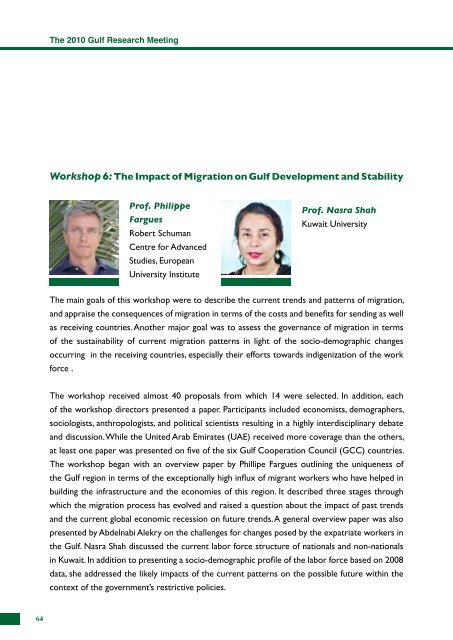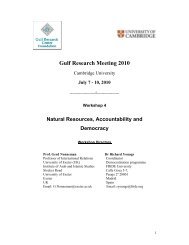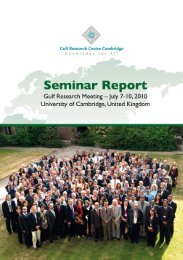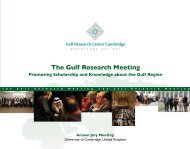GRM 2010 Report - Centre of Islamic Studies - University of ...
GRM 2010 Report - Centre of Islamic Studies - University of ...
GRM 2010 Report - Centre of Islamic Studies - University of ...
Create successful ePaper yourself
Turn your PDF publications into a flip-book with our unique Google optimized e-Paper software.
64<br />
The <strong>2010</strong> Gulf Research Meeting<br />
Workshop 6: The Impact <strong>of</strong> Migration on Gulf Development and Stability<br />
Pr<strong>of</strong>. Philippe<br />
Fargues<br />
Robert Schuman<br />
<strong>Centre</strong> for Advanced<br />
<strong>Studies</strong>, European<br />
<strong>University</strong> Institute<br />
Pr<strong>of</strong>. Nasra Shah<br />
Kuwait <strong>University</strong><br />
The main goals <strong>of</strong> this workshop were to describe the current trends and patterns <strong>of</strong> migration,<br />
and appraise the consequences <strong>of</strong> migration in terms <strong>of</strong> the costs and benefits for sending as well<br />
as receiving countries. Another major goal was to assess the governance <strong>of</strong> migration in terms<br />
<strong>of</strong> the sustainability <strong>of</strong> current migration patterns in light <strong>of</strong> the socio-demographic changes<br />
occurring in the receiving countries, especially their efforts towards indigenization <strong>of</strong> the work<br />
force .<br />
The workshop received almost 40 proposals from which 14 were selected. In addition, each<br />
<strong>of</strong> the workshop directors presented a paper. Participants included economists, demographers,<br />
sociologists, anthropologists, and political scientists resulting in a highly interdisciplinary debate<br />
and discussion. While the United Arab Emirates (UAE) received more coverage than the others,<br />
at least one paper was presented on five <strong>of</strong> the six Gulf Cooperation Council (GCC) countries.<br />
The workshop began with an overview paper by Phillipe Fargues outlining the uniqueness <strong>of</strong><br />
the Gulf region in terms <strong>of</strong> the exceptionally high influx <strong>of</strong> migrant workers who have helped in<br />
building the infrastructure and the economies <strong>of</strong> this region. It described three stages through<br />
which the migration process has evolved and raised a question about the impact <strong>of</strong> past trends<br />
and the current global economic recession on future trends. A general overview paper was also<br />
presented by Abdelnabi Alekry on the challenges for changes posed by the expatriate workers in<br />
the Gulf. Nasra Shah discussed the current labor force structure <strong>of</strong> nationals and non-nationals<br />
in Kuwait. In addition to presenting a socio-demographic pr<strong>of</strong>ile <strong>of</strong> the labor force based on 2008<br />
data, she addressed the likely impacts <strong>of</strong> the current patterns on the possible future within the<br />
context <strong>of</strong> the government’s restrictive policies.





